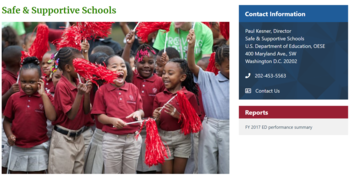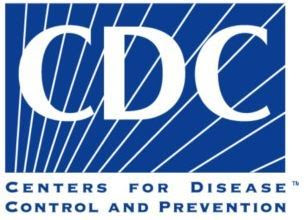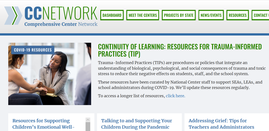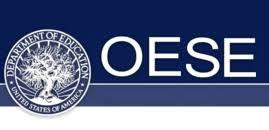
August 2020, Volume 1, Issue 7
Office of Elementary and Secondary Education
Office of State Grant and Program Support Newsletter

From the Deputy Assistant Secretary
Letter From Ruth Ryder, Deputy Assistant Secretary for the Office of State Grant and Program Support

Dear Partners and Stakeholders:
Although we are still in the middle of the summer, starting school is heavy on the minds of students and families and is only days or weeks away. We realize this summer has brought about new challenges and decisions for many schools and families on what school will look like for them this fall. At OESE, we have been working to support SEAs, LEAs, and schools to start school in a productive and safe way that reflects the whole needs of students. As noted by OESE Assistant Secretary Frank Brogan in a recent White House call, “Education leaders need to examine real data for their own states and communities in order to weigh all associated risks. We encourage them to consider: physical health and safety of students and staff; mental health of students; social-emotional development of students; and lost opportunities for students, such as sports, band/choir, clubs, and so on.”
In this edition, we are highlighting resources related to student support and safety as we reopen schools this fall. Several of our technical assistance (TA) centers have webinars and resources to support decision-making and implementation related to getting back to school effectively and safely. I hope you find the resources discussed below helpful. In addition to the resources developed by our TA centers, a number of documents have been released by the Department of Education and OESE program offices to help SEAs, LEAs, and schools navigate through this challenging time. I want to specifically point out the Alternative Fund Use Authority (AFUA) for the Small Rural School Achievement (SRSA) program, which provides greater latitude to spend specific funds. We know our rural schools have unique challenges, and the AFUA offers flexibility in use of funds.
August is always a busy time for the discretionary side of our work. We have several grant competitions that closed in July and August that will be paneled and awarded prior to the end of the fiscal year on September 30. Specifically, the Office of Indian Education has published three notices inviting applications to support the important work for Native American students. The three competitions are Native American Language (NAL) Grants, (2) Demonstration Grants, and (3) State and Tribal Education Partnerships (STEP).
Finally, because fall will be here before we know it, the Office of State Grant and Program Support continues to look at additional support we can provide to our grantees. This is not only through listening sessions and updated FAQs, but also by working closely with the State and Grantee Relations Office on their oversight of CARES Act funds, specifically GEER and ESSER funds, and supporting their efforts on these grant programs.
Enjoy the rest of your summer – we all have a very busy year ahead!
All the best –
Ruth Ryder
|

Monthly Office Spotlight: Office of Safe and Supportive Schools

The Office of Safe and Supportive Schools (OSSS) supports schools and communities in ensuring the health and well-being of students. OSSS administers, coordinates, and recommends policy, as well as administers and manages grant programs and technical assistance centers addressing the overall safety and health of school communities nationwide.
OSSS is organized into two groups: the Safe and Supportive Schools Group and the Student Support and Academic Enrichment Group. Together, the two groups support grantees across the nation and administer numerous programs, including:
- the Student Support and Academic Enrichment Program (Title IV, Part A), which addresses well-rounded educational opportunities in both traditional, in-person settings and virtual settings, as well as safe and healthy student programming;
- the Project Prevent Grant Program, which enhances schools’ and school districts’ ability to identify, assess, and serve students exposed to pervasive violence; and
- the School Climate Transformation Grant Program, which helps schools and school districts develop, enhance, or expand their systems of support related to school climate programs.
There are several technical assistance centers funded by OSSS that support grantees, including:
Title IV-A Technical Assistance Center (T4PA Center)
The T4PA Center provides SEAs with dedicated support for implementing the Title IV, Part A Student Support and Academic Enrichment (SSAE) program. The T4PA Center provides SSAE state coordinators with assistance across the program’s diverse content areas by developing and disseminating high-quality resources, information, and trainings, and by providing access to a national cadre of subject matter experts who can offer targeted technical assistance.
Positive Behavioral Interventions & Support (PBIS) TA Center
The purpose of the PBIS TA Center is to improve the capacity of SEAs, LEAs, and schools to establish, scale up, and sustain the PBIS framework to (a) scale up tier 2 and 3 systems to improve outcomes for students with, or at-risk for, disabilities, (b) enhance school climate and school safety, and (c) improve conditions for learning to promote the well-being of all students.
National Center on Safe Supportive Learning Environments (NCSSLE)
See more about NCSSLE under Child Safety & Well Being Resources, below.
Center to Improve Social and Emotional Learning and School Safety (SEL Center)
The purpose of the SEL Center is to provide technical assistance to support implementation of evidence-based social and emotional learning programs and practices by enhancing the capacity of (1) SEAs to support their LEAs and (2) LEAs to support their schools. The SEL Center supports the work of OSSS by increasing the capacity of SEAs and LEAs as they work to assist their stakeholders.
|

Child Safety & Well Being Resources

Featured Work from REL Mid-Atlantic: Considerations for Reopening Pennsylvania Schools
The Commonwealth of Pennsylvania recently released updated guidance to LEAs on reopening their schools, Considerations for Reopening Pennsylvania Schools, informed by research developed in partnership with REL Mid-Atlantic. Like other states, Pennsylvania must balance the educational imperative to open schools with the public health imperative to keep COVID-19 infection rates manageable until a vaccine becomes available. REL Mid-Atlantic’s work focused on decision-making around health, safety, instruction, and equity challenges. It conducted three tasks to help the Pennsylvania Department of Education identify evidence-based options for school leaders and communities:
- Examined emerging evidence on the spread of COVID-19 in schools, alongside evidence on the effects of remote learning outside of school.
- Interviewed a wide range of stakeholders from across the state to better understand operational, educational, and public health challenges and concerns related to reopening schools.
- Worked with public health research colleagues to develop a cutting-edge, agent-based computational model (ABM) of disease spread in schools to predict the relative effectiveness of different mitigation strategies for reopening.
Evidence suggests that most children are at low risk of serious symptoms of COVID-19, but that schools might play a large role in transmission, posing larger risks to adults with whom infected children come into contact. Fortunately, the model suggests that schools can substantially reduce infection spread while reopening, with appropriate precautions. The ABM found that dividing students into smaller groups, each of which comes to school only 20 to 40 percent of total school days, is likely to substantially slow the rate of infection spread compared with having all students attend school every day. Based on a recent review of state websites, Pennsylvania appears to be the first state to have its reopening guidance informed by evidence-based modeling of the relative effects of mitigation strategies on the spread of COVID-19 in schools.
|


School Reopening Webinar Series
The School Reopening Webinar Series, presented by IDRA EAC South, features conversations with students, families, educators, administrators, public health experts, and other community leaders to explore what the future holds for reopenings, mental health, and student emotional well-being in the wake of myriad of issues facing today’s students. Recordings of each of the School Reopening Series conversations are available on the EAC South’s COVID-19 Learning Goes On website.
|


CDC Public Health-Related Guidance on Returning to School
In addition to these school reopening resources, the CDC released public health-related guidance on preparing K-12 school administrators for a safe return to school in fall 2020. This guidance is intended to aid school administrators as they consider how to protect the health, safety, and well-being of students, teachers, other school staff, their families, and communities and prepare for educating students this fall.
|


NCSSLE Resources: Child Abuse, COVID-19, and More
The National Center on Safe and Supportive Learning Environments (NCSSLE), one of the technical assistance centers funded by OSSS, provides training and technical assistance to schools, school districts, and educational agencies to support the development of safe and supportive learning environments. NCSSLE addresses a wide variety of topics that impact school climate, ranging from bullying and violence prevention to tools for measuring and identifying needs for school climate. NCSSLE’s COVID-19 webpage provides resources focused on protecting child well-being that speak to the unique circumstances educators face in protecting children from maltreatment during the pandemic. There are general items that address safety planning, improving child interviews in abuse cases, and prevention. In addition, the NCSSLE website offers a variety of resources that address child abuse, such as Resources to Protect Child Well-being, found in the expanded tables here.
|



Safe School Environments: New OESE Technical Assistance Resource Page
OESE has created a resource page on its website to support states, districts, schools, and families to navigate K-12 education during the challenging times of the global pandemic. As schools plan to return, it is critical that education leaders ensure our school settings — both in-person and virtual — are safe places to learn. The Safe Learning Environments resource collection includes high-quality resources to improve school safety, conditions for learning, school climate, and access to systems of care and support for schools, districts, students, families, and school communities.
|


Federal School Safety Clearinghouse
The Federal School Safety Clearinghouse (FSSC) is comprised of members from the U.S. Departments of Education, Health and Human Services, Homeland Security, and Justice. Earlier this year, the FSSC, in coordination with the White House, launched the SchoolSafety.gov website. In June, the FSSC introduced the State Information Sharing Tool, a new state-focused functionality on SchoolSafety.gov. This tool enables members of the academic community to search for state-specific school safety information and resources.
The new State Information Sharing Tool aims to:
- provide the academic community with a one-stop shopping for state-specific school safety information;
- provide a streamlined and centralized tool for connecting the academic community to their respective state officials as well as connecting state officials with one another; and
- enhance collaboration between state school safety leaders and the FSSC by establishing a sustained engagement platform.
In the coming months, the FSSC will continue to coordinate with states and territories to further develop this tool by adding additional state-specific school safety information and resources.
|


Resources for Trauma-Informed Practices
The Comprehensive Center Network has assembled collections of resources to support continuity of learning as educators and families have transitioned from traditional classroom settings to learning from home through online resources. The most recent collection released is Continuity of Learning: Resources for Trauma-Informed Practices (TIP). TIPs are procedures or policies that integrate an understanding of biological, psychological, and social consequences of trauma and toxic stress to reduce their negative effects on students, staff, and school systems.
|

Technical Assistance Resources and Updates

Alternative Fund Use Authority
Alternative Fund Use Authority (AFUA) allows LEAs eligible for the Small, Rural School Achievement (SRSA) program, one of the two formula grants included in the Rural Education Achievement Program (REAP), to spend Title II, Part A and Title IV, Part A funds with more flexibility. When exercising AFUA, LEAs may use Title II, Part A and Title IV, Part A funds for activities under any of the allowable uses for SRSA grant funds (i.e., Title I, Part A; Title II, Part A; Title III; Title IV, Part A; and Title IV, Part B). For example, if an LEA has depleted both its REAP and Title IV, Part A funds and is seeking to supplement distance learning resources, the LEA could exercise AFUA to use any remaining Title II, Part A funds toward purchasing supplemental online resources such as digital practice problems or online reading materials. LEAs must be eligible for SRSA, but do not need to apply for (or receive) SRSA funds to use AFUA. An LEA must notify its SEA of its intent to exercise this authority by the state-established deadline. For more information on AFUA see the REAP website or see Section 5211(a) of the ESEA, as amended.
|

When Crisis Calls – Look to Schools’ First and Forever Responders!
The National Comprehensive Center wrote a blog HERE&a
![]()
About the Author
Ruth Ryder is the Deputy Assistant Secretary for the Office of Office of State Grant and Program Support in the Office of Elementary and Secondary Education (OESE) at the U.S. Department of Education. In this role, Ms. Ryder oversees a broad range of management, policy, and program functions related to formula and discretionary grant programs under the Elementary and Secondary Education Act, as amended by the Every Student Succeeds Act (ESEA). Ms. Ryder was previously the deputy director of the Office of Special Education Programs in the Office of Special Education and Rehabilitative Services, which she joined in 1988. Prior to joining the Department, Ms. Ryder was a program administrator in a Washington state school district. There she had responsibility for the Elementary and Secondary Education Act Title 1 and Title II programs, state-remediation, gifted education, outcome-based education, and state- and district-wide testing programs. Ms. Ryder has a bachelor’s degree in psychology and elementary education and a master’s degree in special education.
Read next
Projects & Events
Bruman Group Spring Forum | April 29th - May 1st
USED & White House
President Signs Executive Order to Dismantle ED
USED & White House
ED Releases Guidance on Inclusive Practices Under IDEA and ESEA
| |








